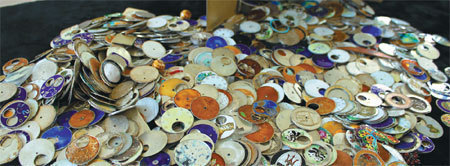 |
|
Xiong Songtao and his team achieve mastery of dial making by producing thousands of designs, including some failures along the way. Photos by Wang Kaihao / China Daily
|
Intricate enamel pieces used in top-quality watches are being produced in China, and the nation's watchmakers want consumers to know that their work is just as good as the top artisans in Europe. Wang Kaihao reports.
In a village in Huoxian town, a one-hour drive from downtown Beijing, there is an unremarkable looking warehouse. It seems incredible that this inconspicuous place is where delicate enamel creations of the highest craftsmanship are produced.
Xiong Songtao, 38, was born in a cabin adjacent to the workshop.
"Here, I breathe fresh air and grow organic vegetables," he says.
He wears a confident smile. "I don't want to go to town to market my product. People who know about my vitreous enamel will come to me," he says.
Among the numerous delicate pieces that sparkle throughout his workshop, the miniature watch dials are his greatest source of pride. He uses cloisonne, an ancient technique for decorating metalwork that involves applying 0.04-mm-thin golden wires to form raised lines on a silver body, which contain different areas of enamel.
Cloisonne enamel in China is generally believed to date back to the 15th century and was greatly beloved by royals, but traditionally, a copper body was used.
"I accidentally picked up a luxury magazine in 1998 and saw European enamel watches," Xiong says. "I said to myself: I was born making enamel. Why not give it a try?"
Xiong is the third generation in his family to work with enamel. Some artisans from the royal workshop in the Forbidden City scattered to the outskirts of Beijing in the late Qing Dynasty (1644-1911). Xiong's grandfather became an apprentice.
Having graduated from college with a business major in the mid-1990s, Xiong was at first reluctant to take over the workshop from his father.
"But struggling in society is not easy," he says. "When I made several articles by myself for the first time, I felt the responsibility of inheriting the family trade."
We recommend:
